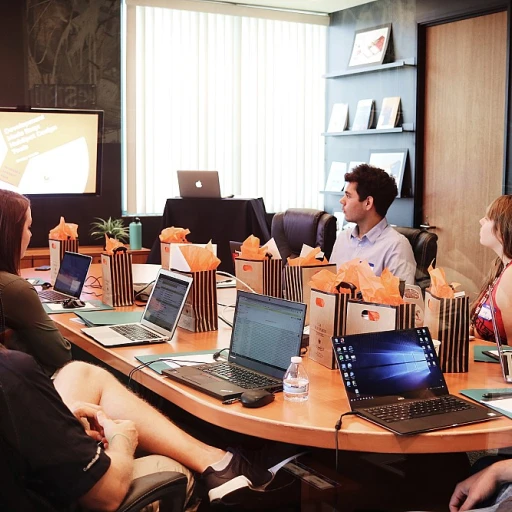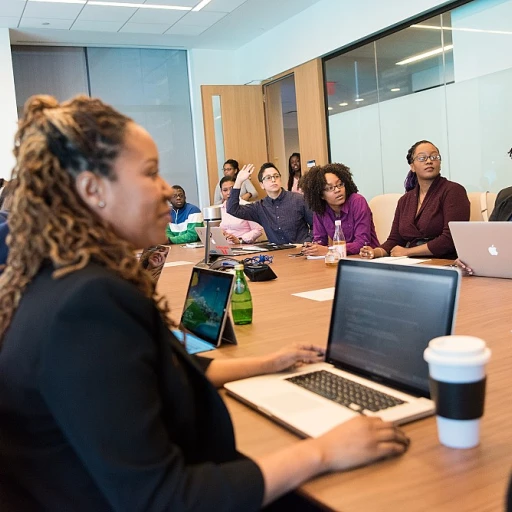The Changing Face of Leadership
Embracing New Leadership Dynamics
The landscape of leadership is undergoing a profound transformation. Gone are the days of relying solely on traditional hierarchies and command structures. Today's leaders must navigate an increasingly complex environment characterized by rapid technological advancements, globalization, and evolving societal values. As these changes unfold, organizations must adapt and refine their leadership development strategies to remain competitive and effective.
Aspiring leaders now find themselves at the intersection of these shifts, where they must hone a wide range of competencies, from emotional intelligence to cross-cultural communication, to lead effectively. The demand for innovative and adaptable leaders is more significant than ever, prompting organizations to seek fresh approaches to developing these essential skills. This evolution in leadership expectations poses both challenges and opportunities, necessitating a closer look at how we nurture the leaders of tomorrow.
By embracing new leadership dynamics, organizations can unlock the power of leadership workshops to foster resilience and adaptability among their teams. As we explore further, the role of innovative leadership programs, effective training strategies, and the cultural contexts in which these leaders operate becomes increasingly vital. With practical examples and real-world success stories, we'll uncover how cutting-edge developments in leadership training are shaping successful leaders for the future.
In this shifting landscape, it's clear that the tools we provide emerging leaders today will have a long-lasting impact on their ability to steer organizations toward success in an ever-evolving world. Understanding and embracing these new dynamics is crucial to fostering a generation of innovative and forward-thinking leaders.
Innovative Leadership Programs: What Sets Them Apart?
Unique Features of New Leadership Programs
In today's rapidly evolving business environment, leadership programs are stepping up their game to ensure that future leaders are equipped with the necessary skills and mindsets needed to thrive. Unlike traditional approaches, these programs emphasize personalized and practical learning experiences that cater to the diverse needs of modern leaders.
One of the standout features of these innovative programs is the incorporation of technology to create adaptive learning environments. Virtual reality, gamification, and AI-driven assessments offer a customized curriculum that aligns with individual learning styles, thus enhancing engagement and retention of knowledge. This technological integration not only makes learning more accessible but also helps in understanding complex leadership challenges through simulated scenarios.
Another critical element that sets contemporary leadership programs apart is their emphasis on emotional intelligence and cultural competency. While technical skills remain important, there is a growing recognition of the soft skills required to lead effectively in multicultural settings. By focusing on emotional awareness and cross-cultural communication, these programs prepare leaders to navigate the complexities of the global market.
Moreover, experiential learning opportunities provide participants with real-world environments where they can apply their skills and receive immediate feedback. Whether through internships, mentoring, or collaborative projects, these hands-on experiences encourage leaders to apply innovative solutions to real business problems, thus bridging the gap between theory and practice.
Curious about how leadership workshops play a crucial role in these programs?
Unlock the power of leadership workshops to gain deeper insights into how these interactive sessions contribute to a leader's growth.
Leadership development programs are no longer confined to the boundaries of the traditional classroom. By incorporating cutting-edge methodologies and focusing on holistic development, they are creating a new breed of leaders ready to tackle the challenges of tomorrow.
Driving Innovation Through Leadership Training
Fostering a Culture of Innovation in Leadership Programs
In today's rapidly changing business environment, organizations must foster an atmosphere where innovation can thrive. This necessitates redefining traditional leadership training methods. Instead of simply imparting knowledge, progressive leadership programs focus on cultivating leaders who can drive innovation and navigate complex challenges effectively.
A critical aspect of these innovative programs is the inclusion of experiential learning opportunities. These programs often employ hands-on projects, simulations, and real-world problem-solving scenarios to equip leaders with the skills they need to lead teams through uncertain waters. By embedding leaders directly into unpredictably complex situations, they can practice innovative thinking and refine their decision-making abilities.
Another key component that sets apart forward-thinking leadership training is the integration of cross-disciplinary learning. Instead of siloed approaches, innovative programs encourage leaders to draw on insights from various fields, thereby broadening their perspective and fostering creative problem-solving skills. This synthesis of knowledge from diverse domains empowers leaders to apply unconventional approaches to overcome organizational challenges.
Moreover, the role of leadership coaching cannot be overstated in these novel training methodologies. Coaching offers leaders a personalized learning journey, enabling them to reflect and adapt their strategies to better foster innovation within their teams. For more insights into this vital aspect, explore the benefits of
leadership coaching as an essential tool in cultivating innovative leadership skills.
Ultimately, these innovative elements in leadership training not only facilitate the enhancement of individual skills but also catalyze cultural shifts within organizations, paving the way for long-term innovative success.
Developing Leadership Skills for Long-Term Success
The Art of Fostering Enduring Leadership Capabilities
In today's rapidly evolving business landscape, the demand for innovative leaders who can navigate complex environments has never been greater. As discussed previously, leadership development is undergoing a transformation to meet these challenges head-on. To create leaders who are not only equipped for the present but also for future demands, it's essential to focus on fostering enduring leadership capabilities that stand the test of time.
Building foundational skills that enhance adaptability, critical thinking, and emotional intelligence is at the heart of cultivating leaders capable of steering organizations through uncertainty. Training programs are placing a strong emphasis on experiential learning, offering participants the chance to apply skills in real-world situations, thus reinforcing their learning and encouraging a deeper understanding of leadership dynamics.
Furthermore, mentoring and coaching have emerged as vital components in nurturing long-term leadership development. These methods provide leaders with personalized guidance, enabling them to refine their skills, learn from experienced professionals, and develop a nuanced understanding of their unique leadership style. This combination of tailored guidance and hands-on experience equips leaders with the tools they need to foster resilience and drive success within their organizations.
Investing in a holistic approach that includes both skill-building and personal growth opportunities ensures that leaders are not only prepared to tackle immediate challenges but can also adapt to future demands with confidence. As organizations continue to embrace this approach, they are laying the foundation for a sustained leadership pipeline that can drive continuous innovation and success.
The Role of Culture in Leadership Development
The Influence of Cultural Dynamics on Leadership Growth
In an era marked by rapid globalization and interconnectedness, the role of culture in shaping leadership development is more pronounced than ever. As we delve into the aspects outlined in previous sections, it's clear that innovative leadership programs are increasingly recognizing the need to incorporate cultural nuances within their frameworks.
Understanding different cultural contexts is essential for crafting effective leaders. Leaders today must be equipped with the ability to navigate complex multicultural environments and to foster inclusive workplace cultures. This goes beyond the traditional notions of leadership, embracing a more holistic approach that values diversity as a core asset.
Moreover, culture fundamentally shapes the values and behaviors of individuals, making it a pivotal component in shaping leadership styles. Training programs that aim to develop leaders for long-term success must integrate cultural competence as a foundational aspect, preparing leaders to not only tolerate but also celebrate differences.
Consider the success stories of leaders who have excelled by understanding and leveraging cultural dynamics. These leaders have not only driven remarkable transformation within their organizations but have also set benchmarks for others to follow.
Incorporating cultural awareness into leadership development initiatives enables leaders to build trust and foster collaboration in diverse teams, ultimately driving the kind of innovation necessary in today's ever-evolving business landscape.
Real-World Success Stories of Innovative Leaders
Triumphs of Visionary Leaders
To grasp the true essence of pioneering leadership, it's invaluable to look at the achievements of those who have charted new courses in their organizations. In the fast-evolving landscape of leadership, as mentioned earlier, the changing face of leadership requires dynamic and adaptable strategies. Let's delve into real-world examples where innovative leadership has transformed not only companies but industries at large.
One striking example is the story of a tech company CEO who implemented a groundbreaking leadership development program. This initiative focused on cultivating creativity and empowering employees at all levels to propose ideas and lead projects. The result? A dramatic increase in product innovation and a significant boost in employee engagement. The CEO's visionary approach underscored the importance of allowing leaders to develop critical thinking and problem-solving skills over time.
Similarly, a retail giant's leadership stayed ahead of the curve by embracing digital transformation long before it became the norm. This foresight was facilitated by leadership training programs that prioritized agility and forward-thinking. By continuously fostering leadership skills, the company ensured its teams were prepared to tackle emerging challenges and seize new market opportunities.
In these instances, the leaders understood that success in the long term demands more than just traditional management skills. It requires a culture that encourages innovation, as well as sustained efforts to nurture leadership qualities that adapt to new realities. It's clear that those who invest in developing leadership skills emerge not just as leaders, but as pioneers driving future success.
These success stories speak volumes about the pivotal role culture plays in nurturing a fertile ground for innovative leadership. They remind us of the powerful impact a visionary leader can have when they are aligned with dynamic, forward-looking programs.








